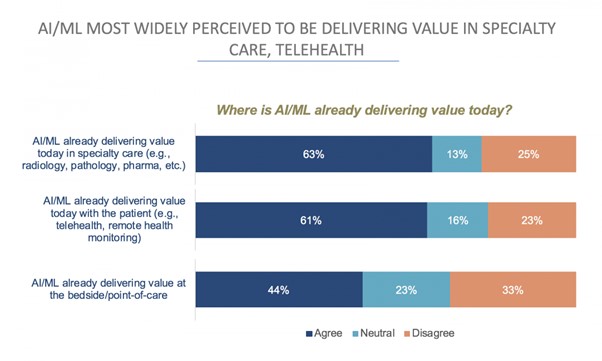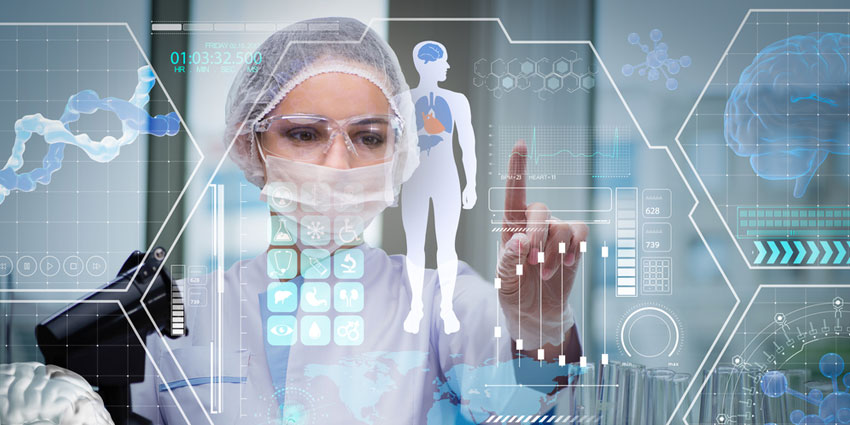Diagnostics is a complex and costly healthcare activity, often rife with myriad errors. AI can enable better and more accurate diagnostics, allocating resources to where they are needed and doing so at revolutionary speeds not thought possible just a few years ago. AI can also help doctors become judgment-free while searching for the cause of an illness and speed up the time for doctors and nurses to get patients the treatment they need.

Generally, healthcare AI tools use deep learning-based models, which reduces reliance on doctors, saves patients time, and improves the accuracy of diagnosis. Incoming data is entered into the system, which then processes it and immediately delivers results. Combining deep learning with structured medical data, for example, improves the accuracy of medical diagnosis for 29.2% of rare diseases—and for 32.9% of very-rare diseases.
AI has quickly overtaken human interpretation, tracking stats like heart rate and stress levels. As the technology becomes more accessible and reduces costs, healthcare providers are moving from piloting AI applications to building them into their core workflow. In the future, this means that as-needed consultations with a doctor could be augmented with well-trained healthcare and AI software to help them diagnose health problems.
Enhanced Efficiency of Clinical Decisions
AI is set to improve the efficiency of clinical decision-making, innovate healthcare solutions, and elevate patient care. Analyzing a patient’s symptoms and traits allows AI to make informed diagnostic decisions and significantly improve healthcare quality.
Developments in AI are such that doctors will soon be able to optimize a patient’s treatment without needing personal interaction. It would be a one-size-fits-most approach, allowing healthcare providers to reactivate the standard procedure of having doctors already fully engaged with their patients in virtual exam rooms.
Improved Image Recognition
The process of diagnosing medical conditions largely depends on the images taken and recorded at the time of the MRI and other similar procedures. With more medical procedures shifting to digital, the role of AI in improving image recognition becomes more important. Researchers have developed diagnostic work-up image recognition with the help of AI.
With deep neural networks and machine learning—which have seen extensive progress in this field over the past few years—AI-powered imaging technologies can reduce the clinical turnaround time, providing better image recognition and better health outcomes for patients. This can improve the efficiency of the diagnostic work-up and lead to the early detection of disease.
Reduced Pressure on Laboratory Resources
What do laboratory resources and AI have in common? The answer is data. There is a high demand for laboratory resources (partly due to COVID-19), especially for research vital for response and diagnosis. To cope with this tension, scientists are turning to automation to reduce the pressure on laboratory resources.
The key benefits of AI-assisted laboratory work include a reduction in the pressure on lab resources, an increased workspace for physicians to spend more time on patient care, and a boost to healthcare providers’ overall quality of care. The ML-based technique promises an alternative to the intense manual examination of mass-spectrometric data. AI technology can assist medical professionals in streamlining their work while also improving the quality of their services and reducing the stress at the workplace.
Universities have also been taking advantage of AI to create analytical alternatives. This approach is yet to be seen in the clinical process—where biopsy samples will be re-analyzed using AI. The AI algorithms will also scan, segment, and navigate data to identify and prioritize relevant information. The technology will further improve access times, decrease risks, allow scientists to focus on other tasks, and help improve patients’ trust in diagnoses.
Alleviated Physician Burnout
According to a study from the Canadian Medical Association, burnout among physicians is on the rise, and urgent steps are needed to tackle the issue before it further escalates. Physicians most often experience feelings of “imposter syndrome,” which is self-doubt related to high social pressure. Less than 50% of doctors find their jobs motivating, and some feel the stress of their heavy workloads will take a toll on themselves and their patients.
Data analytics, specifically AI in diagnostics, is a potential solution. Technological advances in AI could reduce the pressure on doctors, who often lack the time to examine their patients more carefully. Diagnoses would be more accurate, and the medical staff would be empowered to spend more time on the job with less stress. That’s just one of the many ways AI is poised to transform healthcare workers’ lives.
Increased Support for the Radiology Profession
The radiology profession is fundamentally shifting as AI moves from research labs to clinics. The financial impact on radiology could be huge as AI algorithms can reduce costs, increase productivity, and offer personalization for patients.
AI is supporting the radiology profession by helping doctors interpret CT scans, MRIs, and other imaging technologies. The AI systems compare the actual radiology patient images to the digital data gathered, alert physicians to discrepancies, and flag time-critical items to investigate. This can help healthcare providers diagnose diseases faster and more accurately. Healthcare professionals will have more time to focus on their patients and make the most of their consulting hours.
Final Word
AI and ML are far more advanced than even a decade ago, but despite potential revolutionary health benefits, many hospitals still aren’t using them. An ongoing problem seems to be that humans find the tools intimidating and need help with the data. New data-analytics tools can help solve this, but hospitals need to bring AI into their business matrix to help take data, process it, and produce valuable recommendations.

